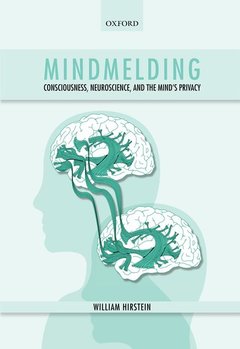Mindmelding Consciousness, Neuroscience, and the Mind's Privacy
Langue : Anglais
Auteur : Hirstein William

Can consciousness and the human mind be understood and explained in sheerly physical terms? Materialism is a philosophical/scientific theory, according to which the mind is completely physical. This theory has been around for literally thousands of years, but it was always stymied by its inability to explain how exactly mere matter could do the amazing things the mind can do. Beginning in the 1980s, however, a revolution began quietly boiling away in the neurosciences, yielding increasingly detailed theories about how the brain might accomplish consciousness. Nevertheless, a fundamental obstacle remains. Contemporary research techniques seem to still have the scientific observer of the conscious state locked out of the sort of experience the subjects themselves are having. Science can observe, stimulate, and record events in the brain, but can it ever enter the most sacred citadel, the mind? Can it ever observe the most crucial properties of conscious states, the ones we are aware of? If it can't, this creates a problem. If conscious mental states lack a basic feature possessed by all other known physical states, i.e., the capability to be observed or experienced by many people, this give us reason to believe that they are not entirely physical. In this intriguing book, William Hirstein argues that it is indeed possible for one person to directly experience the conscious states of another, by way of what he calls mindmelding. This would involve making just the right connections in two peoples' brains, which he describes in detail. He then follows up the many other consequences of the possibility that what appeared to be a wall of privacy can actually be breached. Drawing on a range of research from neuroscience and psychology, and looking at executive functioning, mirror neuron work, as well as perceptual phenomena such as blind-sight and filling-in, this book presents a highly original new account of consciousness.
1. The Impasse. 2. An Alternative Framework. 3. The Brain and its Cortex. 4. Consciousness. 5. Preparing Representations. 6. Executive Processes. 7. Sense of Self. 8. The Reality and Importance of the Executive Self. 9. Sharing Conscious States. 10. Mindtalk. 11. Disentangling Self and Consciousness. 12. Representation and Consciousness. 13. The Mind and Its Care.
William Hirstein is Professor and Chair of the Philosophy Department at Elmhurst College, in Elmhurst, Illinois, USA. He received his PhD from the University of California, Davis, in 1994. His graduate and postdoctoral studies were conducted under the supervision of John Searle, V. S. Ramachandran, and Patricia Churchland. He is the author of several books, including On the Churchlands (Wadsworth, 2004), and Brain Fiction: Self-Deception and the Riddle of Confabulation (MIT, 2005).
Date de parution : 01-2012
Ouvrage de 304 p.
18.7x25.5 cm
Thèmes de Mindmelding :
© 2024 LAVOISIER S.A.S.



